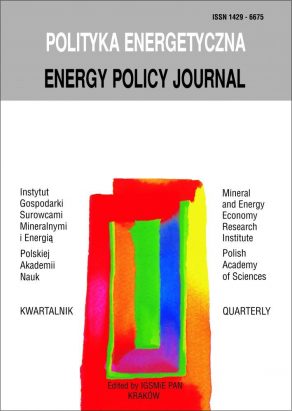Editor-in-Chief: Eugeniusz Mokrzycki, DSc (Eng), Professor
ISSN 1429-6675
The Polityka Energetyczna – Energy Policy Journal is a forum for the exchange of ideas in the field broadly defined energy policy in Poland and worldwide. The journal has been published continuously since 1998. The journal provides a forum for scientists from Poland and around the world. The published articles are available in an open repository under the Creative Commons Attribution License.4.0 (http://creativecommons.org/licenses/by/4.0/). Articles are published in English. All articles are reviewed by at least two independent reviewers (the Editorial Board selects articles according to the double-blind review process).
The Publisher does not charge any fees for the publication of an article, nor does it provide any remuneration to authors. All papers published in Polityka Energetyczna – Energy Policy Journal (current and archive) are fully available on journal’s webpage.
The Energy Policy Journal Polityka Energetyczna has received funding from the Ministry of Science and Higher Education (agreement no.: 524/P-DUN/2018). Financing period: 10.05.2018-1.03.2019.
The Polityka Energetyczna – Energy Policy Journal publishes articles concerning the following topics:
The Polityka Energetyczna – Energy Policy Journal is indexed in:
Publishing Editors:
Technical Editor: Beata Stankiewicz
Mineral and Energy Economy research Institute of the Polish Academy of Sciences
J. Wybickiego 7A, 31-261 Kraków, Poland
Phone: +48 12 632 33-00, Fax: +48 12 632 35-24
Email: polene@min-pan.krakow.pl
The Editorial Board accepts original, unpublished articles within the scope of the journal.
Manuscripts should be coherent, cover one issue at a time and end with conclusions.
The article must not exceed 20 pages in length, including figures and tables.
Submission of an article to the Editor is made by uploading it in the Journal’s Editorial System – in accordance with the Guidelines for Authors.
The indispensable element of the correct submission of the article is attaching in the system signed copyright transfer agreement
The Editorial Board reserves the right to reject a manuscript if:
An article must receive two positive reviews to be published. The reviewers are chosen by the Editorial Board and receive the full manuscript and the review form.
Guidelines for reviewing manuscripts:
The Editorial Board kindly asks reviewers to promptly prepare the review and to submit it in the Editorial System of the Journal.
The editors respects the principles of publication ethics in accordance with the recommendations of the COPE – Committee on Publication Ethics (https://publicationethics.org/).
In particular:
The names of the reviewers of particular articles are not disclosed. Once a year (latest issue), a list of all reviewers is published.
The journal is published in print, which should be regarded as the original version. All versions appearing on-line are reproductions.

List B MNiSW
40 pt
CiteScore:
2.1
SNIP:
0,770
Standard:
Open Access






